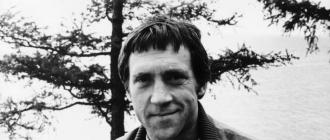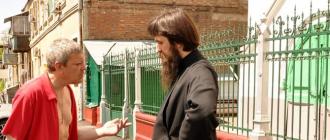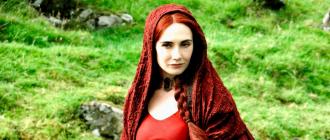David Cameron is Britain's youngest head of government since 1812 and has a modern but rather informal approach to politics. David rose to political prominence as part of the Conservative Party, winning votes with his promise to change the old-fashioned politics of the Labor-dominated United Kingdom.
Cameron came to the post of Prime Minister at a time that was not the best for Britain - the budget deficit forced the statesman to introduce the country into austerity mode, which caused outrage among the population, who saw in the policy of the head of government the support of only the country's elite, and not ordinary residents.
Childhood and youth
David William Donald Cameron was born on October 9, 1966 in the British capital, into a noble and wealthy family. The boy's parents, Ian Donald Cameron and Mary Fleur Mount, had aristocratic roots - among the ancestors of the British Prime Minister are King William IV, famous British Conservative parliamentarians, financiers and bankers. David was the third of four children in a family where upbringing was based on love, support and strictness.
At the age of 7, the future politician began attending the prestigious school of the kingdom - Hatherdown in Winkfield, where children had previously studied. At school, David Cameron did not stand out for his special achievements, as he was an average good student. But even then, the boy began to awaken an interest in general conservatism, which set the direction for his future career as a politician.
Upon completion preparatory school Cameron, according to family tradition, attended Eton College and then graduated from Oxford University. At Oxford, David proved himself to be the best student and, having passed excellent exams in politics, economics and philosophy, received a first-class diploma.

After university, the future British prime minister was going to engage in journalism or banking, but fate decreed otherwise - the young man ended up working in the research department of the Conservative Party, which was a successful start to his political career.
Policy
For the first three years in politics, David Cameron developed a strategy for the Conservative Party and prepared speeches for the then current British Prime Minister John Major. The young man proved himself to be a hardworking and proactive employee, for which he received his first promotion and was appointed head of the political department of the party.

In 1992, Cameron was appointed adviser to British Chancellor of the Exchequer Norman Lamont, and a year later became special adviser to Home Secretary Michael Howard. That period political activity The future Prime Minister of Britain was marked by “Black Wednesday”, when London had to withdraw the pound sterling from the European monetary system, which was a disaster for the country’s economy. Having managed to retain the party's trust, Cameron decided to temporarily leave politics and gain professional experience outside of it.
Then Cameron got a job at the London television company Carlton Communications, where he received the position of director of communications. The politician worked in close contact with journalists for 7 years, after which he decided to leave the company to participate in parliamentary elections. Cameron's first three attempts to get into the House of Commons were failures, but in 2001 the politician managed to achieve his goal and get into parliament.

In the House of Commons, Cameron received a prominent post for a young parliamentarian and became head of the Select Committee on internal affairs. In 2005, he was elected head of the Conservative Party and, as leader of the opposition, joined the Royal Privy Council of Great Britain, and also became the country's shadow minister of education. Over the next 5 years, the self-described Eurosceptic politician demonstrated an anti-Labour position, opposing greater EU integration, the hunting ban and anti-terrorism laws, the exclusion of hereditary peers from the House of Lords, as well as the granting of rights to representatives of sexual minorities and the war in Iraq.

During this period, David Cameron became a popular British political leader, which allowed him to win high voter support and overthrow the Labor Party, which was at the helm of power in the UK. In 2010, after the resignation of Prime Minister and Labor Party leader Gordon Brown, Cameron received an offer from the Queen to form a coalition government and became the youngest Prime Minister of Britain in the last 200 years. This event became significant for political biography Cameron.
Prime Minister of Great Britain
Cameron's rise to political heights coincided with the country's acute budget deficit. Therefore, in domestic policy Cameron had to carry out a number of radical and difficult reforms - raise taxes, cut social benefits, increase tuition fees in universities and “freeze” salaries of public sector employees. This sparked Britain's first national strike in decades. However, the Prime Minister managed to reduce the budget deficit to a minimum and lead the United Kingdom out of the economic crisis to a stable state.

As Prime Minister of Great Britain, David Cameron adhered to conservative principles. The politician advocated freedom of business, pursued a tough immigration policy, and supported traditional family foundations. At the same time, under him, a law legalizing same-sex marriage was passed in Britain. David Cameron also continued to fight for independence from the European Union and demanded a review foreign policy EU, giving national governments freedom of action in their own countries. At the same time, the politician advocated maintaining membership in the EU.

David Cameron is responsible for a law on tightening standards for providing social housing to people in need, reforms in free healthcare for British residents, and a law on equality in the matter of succession to the throne. The prime minister is also involved in charitable activities in the country, in which he donates money for the rehabilitation of drug addicts and expensive treatment for children.
Personal life
David Cameron's personal life, unlike many political leaders of other European countries, was not hidden from the public. David married aristocrat Samantha Gwendolyn Sheffield in 1996. Samantha's stepfather was a member of the government of British Prime Minister Major, during whose reign Cameron's political career began. The family of the British Prime Minister had four children, the eldest of whom died in 2009 from epilepsy.
In his free time from politics, the British leader devotes himself to family and hobbies - horse riding, football, hunting, tennis and cooking. His athletic build and tall height (186 cm) allow David to win in sports competitions. Cameron is also interested in art and loves rock music. Even before his election to the post of Prime Minister of Great Britain, David was a popular cyclist throughout the country, as he rode to work in parliament on a two-wheeled “friend,” which was even stolen a couple of times.

In 2015, a resonant media scandal broke out in society, which was provoked by the book “Call Me Davey,” written by Cameron’s youth friend Michael Ashcroft. The so-called autobiography of the British Prime Minister contains a number of remarkable biographical facts from the politician’s turbulent youth. On the pages of the book, a student friend of the British Prime Minister told how Cameron at Oxford was a member of the prestigious Piers Gaveston community, to join which David had to undergo a specific initiation rite.
Because of which the politician began to be condemned in society for sex with a dead animal, it was loudly discussed on the Internet, since Cameron was not discussed only by the lazy, and “Cameron’s Pig” became the main star of most microblogs. The author of the publication also claims that in his youth David Cameron used soft drugs, which the politician himself did not even publicly refute, saying that it was a normal “university experience.”
David Cameron now
At the beginning of 2016, David Cameron proposed holding a referendum on Britain's membership of the European Union. The prime minister's position was to support cooperation with the European Union on the same basis.

As a result of the national referendum, it turned out that the majority of British citizens support leaving the pan-European organization. In mid-July, after the results were released, David Cameron announced his own. The successor to the country's political leader was the British Home Secretary. In mid-September, Cameron also left the House of Commons.
After resigning, Cameron put forward a list of awards expected from the monarch, which caused outrage among the public and opponents of the former prime minister.
In mid-summer 2017, David Cameron surprised and delighted followers with new collaborations posted online “
Prime Minister of Great Britain since May 2010. Leader of the UK Conservative Party since 2005, member of the House of Commons since 2001. From 1994 to 2001, he was director of corporate communications for television broadcaster Carlton Communications. From 1992 to 1994 he worked as a special adviser to the UK Treasury and Home Office.
David William Donald Cameron was born on October 9, 1966 in London into a rich and noble family. His father, Ian Donald Cameron, was a stockbroker and a direct descendant of King William IV of Great Britain (1765-1837). David's mother, Mary Fleur Mount, was the daughter of a baronet, and several of her grandfathers and great-grandfathers were Tory parliamentarians.
David Cameron attended the prestigious Hatherdown preparatory boarding school in Winkfield in Berkshire, where Queen Elizabeth II's sons Prince Andrew and Prince Edward studied, as well as the children of British billionaires. In 1979, David, according to family tradition, entered the elite Eton College. In May 1983, shortly before taking his first final exams, he was caught smoking marijuana, but since he admitted to his crime and did not distribute the drug among other students, he was not expelled, and for some time he was deprived of the right to leave the college walls. Despite this episode, David did well in his exams at Eton at the end of 1984 and entered Brazenose College at Oxford University. Before starting his studies at Oxford, Cameron was an assistant to a member of the British Parliament from the Conservative Party, Tim Rathbone, and worked for about three months in Hong Kong at the Jardine Matheson corporation. David returned to Europe from Hong Kong railway, having visited Moscow and Yalta, where, in his own words, they wanted to recruit him as an agent of the KGB of the USSR. At Brazenose, Cameron studied for a Bachelor of Arts in an interdisciplinary course in politics, philosophy and economics.
Cameron began his political career on September 26, 1988, when he took a job in the UK Conservative Party's research department, developing party strategy and creating briefings for parliamentary debates. In 1991, Cameron headed the policy division of the research department.
After the Conservatives won the 1992 election, Cameron was transferred to work for the Chancellor of the Exchequer, who was then Norman Lamont. In June 1993, he was appointed as a special adviser to the UK Home Office, where he was responsible for briefing Minister Michael Howard, the future leader of the Conservative Party. In July 1994, Cameron resigned as special adviser to become director of corporate affairs for Carlton Communications. Cameron managed to secure digital satellite broadcasting rights for Carlton Communicatons. In February 2001, Cameron left the firm to contest the parliamentary elections.
After three unsuccessful attempts to be elected to the House of Commons (in 1994, 1997 and 2000), Cameron won a by-election in the 2001 constituency of Witney in Oxfordshire. Following his election to the House of Commons, Cameron chaired the Home Affairs Select Committee, a prominent post, especially for a young parliamentarian. Cameron actively participated in debates and became known as a good speaker. In July 2003, Cameron became a member of the “shadow cabinet”, taking over the post of shadow leader of the House of Commons, Eric Forth. In November 2003, following Smith's resignation as party chairman, Cameron became vice-chairman of the party under the new Conservative leader, Michael Howard. In May 2005, Cameron became shadow education secretary.
Following Labour's victory in the general election, Conservative Party leader Michael Howard announced his resignation. On September 29, 2005, Cameron officially announced that he would run for this post, went through qualifying rounds with voting among members of parliament, and on December 6 defeated David Davis in the all-party election, gaining 66 percent of the votes of fellow party members.
At the next election, in May 2010, the Conservatives won, after which Cameron headed the UK government, which was created jointly by the Conservatives and the Liberal Democrats.
Cameron was called a young, ambitious leader who wants to modernize British politics. Cameron was considered a good speaker and one of the likely contenders for the post of British Prime Minister after the parliamentary elections to be held in June 2009. However, the press has often criticized Cameron for the fact that his policies are based on the country's elite, graduates of Eton and Oxford, and he is poorly aware of the needs of ordinary people in the United Kingdom.
Cameron is married. He has two children. David loves to cook, enjoys tennis, horse riding, hunting and football.
Prime Minister of Great Britain since May 2010. Leader of the UK Conservative Party since 2005, member of the House of Commons since 2001. From 1994 to 2001, he was director of corporate communications for television broadcaster Carlton Communications. From 1992 to 1994 he worked as a special adviser to the UK Treasury and Home Office.
David William Donald Cameron was born on October 9, 1966 in London into a rich and noble family. His father, Ian Donald Cameron, was a stockbroker and a direct descendant of King William IV of Great Britain (1765-1837). David's mother, Mary Fleur Mount, was the daughter of a baronet, and several of her grandfathers and great-grandfathers were Tory parliamentarians.
David Cameron attended the prestigious Hatherdown preparatory boarding school in Winkfield in Berkshire, where Queen Elizabeth II's sons Prince Andrew and Prince Edward studied, as well as the children of British billionaires. In 1979, David, according to family tradition, entered the elite Eton College. In May 1983, shortly before taking his first final exams, he was caught smoking marijuana, but since he admitted to his crime and did not distribute the drug among other students, he was not expelled, and for some time he was deprived of the right to leave the college walls. Despite this episode, David did well in his exams at Eton at the end of 1984 and entered Brazenose College at Oxford University. Before starting his studies at Oxford, Cameron was an assistant to a member of the British Parliament from the Conservative Party, Tim Rathbone, and worked for about three months in Hong Kong at the Jardine Matheson corporation. David returned to Europe from Hong Kong by rail, visiting Moscow and Yalta, where, in his own words, they wanted to recruit him as an agent of the USSR KGB. At Brazenose, Cameron studied for a Bachelor of Arts in an interdisciplinary course in politics, philosophy and economics.
Cameron began his political career on September 26, 1988, when he took a job in the UK Conservative Party's research department, developing party strategy and creating briefings for parliamentary debates. In 1991, Cameron headed the policy division of the research department.
After the Conservatives won the 1992 election, Cameron was transferred to work for the Chancellor of the Exchequer, who was then Norman Lamont. In June 1993, he was appointed as a special adviser to the UK Home Office, where he was responsible for briefing Minister Michael Howard, the future leader of the Conservative Party. In July 1994, Cameron resigned as special adviser to become director of corporate affairs for Carlton Communications. Cameron managed to secure digital satellite broadcasting rights for Carlton Communicatons. In February 2001, Cameron left the firm to contest the parliamentary elections.
After three unsuccessful attempts to be elected to the House of Commons (in 1994, 1997 and 2000), Cameron won a by-election in the 2001 constituency of Witney in Oxfordshire. Following his election to the House of Commons, Cameron chaired the Home Affairs Select Committee, a prominent post, especially for a young parliamentarian. Cameron actively participated in debates and became known as a good speaker. In July 2003, Cameron became a member of the “shadow cabinet”, taking over the post of shadow leader of the House of Commons, Eric Forth. In November 2003, following Smith's resignation as party chairman, Cameron became vice-chairman of the party under the new Conservative leader, Michael Howard. In May 2005, Cameron became shadow education secretary.
Following Labour's victory in the general election, Conservative Party leader Michael Howard announced his resignation. On September 29, 2005, Cameron officially announced that he would run for this post, went through qualifying rounds with voting among members of parliament, and on December 6 defeated David Davis in the all-party election, gaining 66 percent of the votes of fellow party members.
At the next election, in May 2010, the Conservatives won, after which Cameron headed the UK government, which was created jointly by the Conservatives and the Liberal Democrats.
Best of the day
| I am from Odessa! I'm from Odessa! Hello!.. Visited:93 |
Reese Witherspoon: "Being funny is a lot of work" |
IN 1983
IN 1988
1988 -1992
1992 -1993
IN 1993
IN 1994
↓IN 1983 graduated from Eton College. After graduating from college he was his assistant godfather, Conservative MP Tim Rathbone, attended debates in the House of Commons. Worked for about three months at Jardine Matheson Corporation in Hong Kong.
IN 1988 He graduated from Brazenose College at the University of Oxford with a Bachelor of Arts in an interdisciplinary course in Politics, Philosophy and Economics (PPE).
1988 -1992 gg. - worked in the research department of the Conservative Party, also preparing John Major's speeches and economic issues.
1992 -1993 gg. - Political adviser to the Chancellor of the Exchequer, who was then Norman Lamont.
IN 1993 Cameron began working at the Home Office.
IN 1994 year intended to take part in the elections in Ashford, but did not have time to submit an application due to the delay of the train.
In the elections 1997 was elected from Stafford County but was defeated.
1994 -2001 gg. - Director of Corporate Relations at Carlton Communications.
In the elections 2001 was elected Member of the House of Commons for Witney, Oxfordshire.
IN 2005 After the resignation of Michael Howard, under whose leadership the party lost the parliamentary elections, he was elected leader of the party in the third round. Under Cameron's leadership, the party's political course was liberalized.
In parliamentary elections 2010 Cameron is the Conservative Party's candidate for prime minister.
At the pre-election debates in the spring 2010 Cameron, according to polls, lost in the first round of debates to Nick Clegg, but won in the last.
On the evening of May 11 2010 Prime Minister Gordon Brown announced his resignation as head of government and leader of the Labor Party and submitted his resignation as prime minister to the Queen.
That same evening, David Cameron received the Queen's proposal to form a government, whose party recruited greatest number mandates in the general elections on May 6 2010 year (but did not receive an absolute majority in parliament). Cameron announced his intention to form a governing coalition with the Liberal Democrats.
David Cameron is the former head of government of Foggy Albion, who received a high position at the age of 43 and became the youngest British prime minister since 1812.In 2016, he managed to reach important agreements with the leadership of the European Union on special conditions for the country’s presence and separate status in this pan-European association. In particular, the agreements reached provide for the protection of Britain's social system by limiting access to it by migrants from other countries. Thus, the politician defended the interests of his people and the state.
In the referendum on Britain's membership of the EU (held on June 23, 2016), 51.9% of the population voted for secession, after which David Cameron announced his intention to resign, since, in his opinion, Britain needed “new blood” in leadership positions. On July 13, he resigned as prime minister. His successor was Theresa May, who previously served as Home Secretary.
David Cameron's childhood and family
The future famous politician was born on October 9, 1966 in the capital of the United Kingdom into a wealthy aristocratic family. His mother Mary Fleur was a Justice of the Peace (JP) and his father Ian Donald was a stockbroker. She came from the family of Sir William Malcolm Mount, whose paternal ancestors were involved in finance. The Victorian mansion on the family estate in Blairmore, which became home to four generations of David's family, was built by his great-great-grandfather Alex Geddes, who made a considerable fortune in the grain trade in Chicago. 
The boy spent most of his childhood in Pismur (Berkshire). He has a brother Alexander, 3 years older, and sisters: Tanya Rachel, younger by a year, and Claire Louise, born in 1971. The Prime Minister is a descendant of William IV, and through him is related to Queen Elizabeth II of the United Kingdom. His family included Scots, English, and Welsh, and on his mother’s side there were also ancestors of German-Jewish nationality.
From the age of 7, the youngest son was sent to Heatherdown Boys' School, whose graduates included Princes Edward, Earl of Wessex and Andrew, Duke of York. Then he went to Eton College, where he got into ugly story- He was caught smoking marijuana. For violating the rules, David was then fined and forbidden to go beyond educational institution, ordered to rewrite half a thousand lines in Latin.

From the age of 13 he studied at Brasenose. Then the young man entered Oxford. At the university, he excelled in his classes in philosophy, politics and economics. After graduating in 1988, the young man received the highest mark for thesis. His classmates were famous people, including Boris Johnson, who later became the mayor of the British capital.
David Cameron's career
Graduate prestigious university, upon completion, began research work in the relevant department of the Conservative Party. In 1991, he moved to the official residence of the Lord Treasurer and was involved in preparing briefings for the then head of the executive branch John Major. In 1992, successfully moving up the career ladder, he was appointed adviser to the chancellor; in 1993, he was involved in new duties by the head of the Ministry of Internal Affairs. 
Since 1994, Cameron has been involved in journalism at Carlton Communications, an English media company. But he did not give up his desire to become a deputy. David ran for Stafford in 1997 but lost. 2001 was more successful for him; he entered the Supreme Legislative Assembly from Witney (Oxfordshire).
After leaving the post of party leader Michael Howard in 2005, the young politician became the head of the Conservative Party. According to opinion polls, under his leadership this political force gained enormous popularity among citizens. She beat Labor Party supporters for the first time in the previous decade.
Prime Minister David Cameron calls for military action in Syria
In 2008, during the Russian-Georgian war, the Tory leader called for sanctions against the Russian Federation and the suspension of its membership in the G8.
The Tories won the 2010 elections, but the number of seats in the House of Commons was not enough to subsequently form a party majority. The head of Labor and the government, Gordon Brown, has decided to resign. Queen Elizabeth II invited the Conservative leader to form a government.

Among his first actions was the creation of a coalition with the Liberal Democrats led by Nick Clegg. Thus, a coalition government was created in Foggy Albion for the first time in the post-war period. Cameron became prime minister, Clegg his deputy.
David Cameron for Brexit
According to the results of the parliamentary elections in 2015, the Tory party was able to achieve an absolute majority, and the politician formed a one-party government instead of a coalition.
Personal life of David Cameron
On his 30th birthday, the politician married Samantha Sheffield, daughter of Sir Reginald Sheffield, 8th Baronet, and Annabel Jones, Viscountess Astor. The wedding ceremony took place in the Church of St. Augustine of Canterbury. 
David's chosen one is a descendant of King Charles II of England and Scotland. She is a school friend of David's sister Claire, who invited her after leaving Bristol School artistic creativity relax with Cameron's family in Tuscany (Italy). That's where it started romantic relationship young people.
The first-born of the couple, Ivan Reginald Yang, born in 2002, suffered from a rare disease called Ohtahara - a combination of paralysis and severe epilepsy. He passed away at the age of 6.

The couple has two daughters: Nancy Gwen, born in 2004 and Florence Rose Endellion, born in 2010, and a son, Arthur Elwen, born in 2006. When he was born, David decided to take paternity leave. This act was widely covered in the media. It is known that the couple’s youngest daughter was born prematurely when they were vacationing as a family in the village of Saint Endellion. Her wife's name was subsequently included in the baby's name.
The British leader of the executive branch is a lover of tennis, horse riding and hunting. He is a fan of Birmingham FC Aston Villa.






